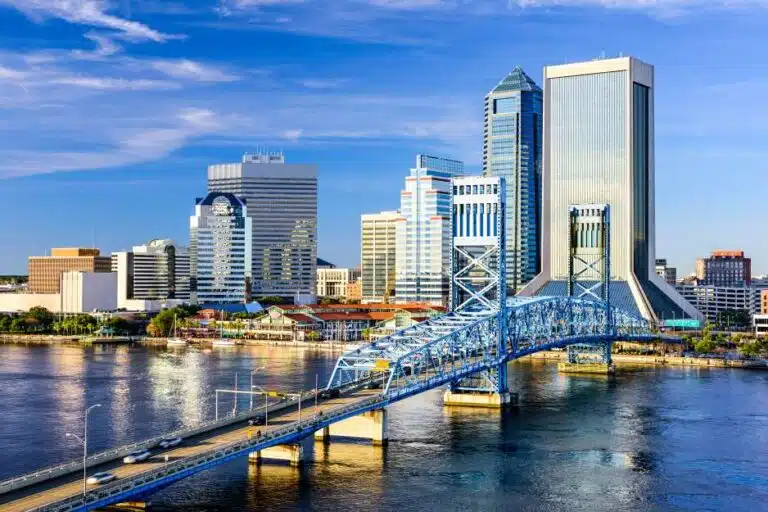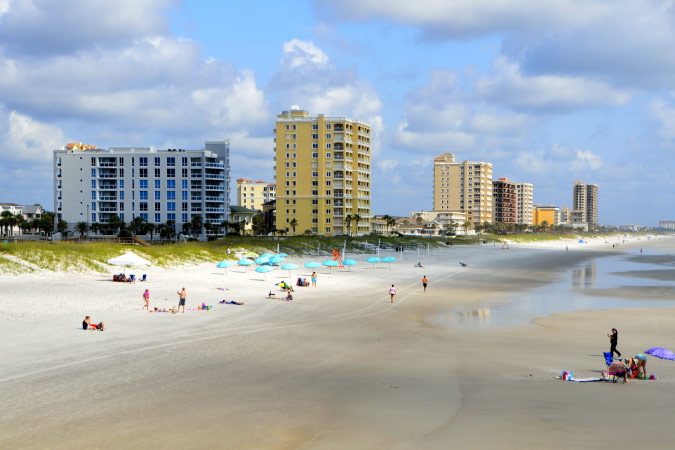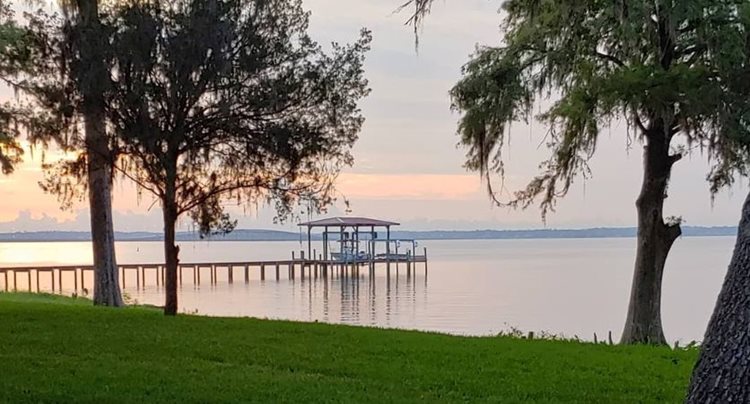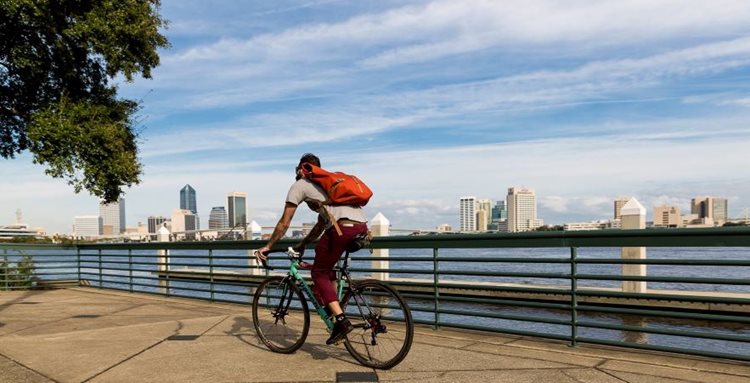
15 Things To Know About Moving to and Living in Jacksonville, Florida
Florida Jacksonville
So you’re thinking about moving to Jacksonville, Florida, huh? Whether you’re relocating for a job or looking for better weather, you’re probably wondering what to expect from living in Jacksonville, Florida. Its reputation for hot summers, picturesque shores, and sprawling geography might precede it, but there’s so much more to this beach-blessed city than meets the eye.
| Planning a move to Jacksonville? Start by getting a quote from PODS. |
Living in Jacksonville at a Glance
- Jacksonville is situated in the northeastern corner of Florida, less than an hour’s drive from Georgia and 350 miles up the coast from Miami.
- Jacksonville is 841 square miles in size.
- By population, Jacksonville is the 10th-largest city in the states and the most populous in Florida, with about 997,200 residents and counting.
- The median age in Jax is 36.3, though about 14 percent of the population falls into the 65+ age group.
- Jacksonville enjoys a whopping 234 days of sunshine on average each year.
As lovely as all that sunshine may be, moving to the most populated city in the state can sound a little overwhelming. How are you supposed to figure out the go-to spots for dinner, what you want to do for fun, which beach to visit on the weekend, how long your commute will be on Monday, and what the pros and cons of living in Jacksonville are? Luckily, we’ve done some of the groundwork for you by breaking down the top 15 things to know about living in Jacksonville.
1. Jacksonville Has a Low Cost of Living for a Big City.
- The average home value for a Jacksonville home is around $296,400, while the average home value for a home in Miami is around $581,500.
- The average monthly rent for a one-bedroom apartment in Jacksonville is around $1,500, and the average size is 976 square feet. In Miami, that goes up to $2,575 for 897 square feet. Less money for more space, anyone?
- The cost of living in Jacksonville is 7 percent below the national average and 5 percent below the state average.
| Q: How much do you need to make to live comfortably in Jacksonville, FL? A: According to a 2023 study from SmartAsset, to live a middle class lifestyle in Jacksonville, the income range you need is between $39,300 and $117,200. Of course, that’s a pretty wide range, as is the definition of what living comfortably means to different people — it really depends on your lifestyle, dependents, and recurring costs. If you just want to make sure you can make ends meet living in Jacksonville, FL, the MIT Living Wage Calculator estimates that the required annual income before taxes for a single adult without dependents is just under $45,900, while two working adults with two children require just over $104,300. |
2. Living in Jacksonville, FL, Is Surprisingly Affordable.
When it comes to buying real estate in Jacksonville, if you’re moving from another major city, you’re likely to be pleasantly surprised by the affordability. The cost of housing is a solid 10 percent below both the state and national average, and as a result, more than half of residents own homes. And even though it’s one of the state’s most bustling metro areas, you can score three bedrooms and a yard within shouting distance of a beach.

The average monthly rent for those living in Jacksonville, FL, hovers around $1,500 — but it’ll certainly cost more to live near the beach.
(Source: @jtbapartments via Instagram)
3. Jacksonville Rentals Are Easy To Come By.
About 43 percent of city dwellers opt to rent apartments in Jacksonville, so the inventory is there for newcomers looking to rent. With an average monthly rent just over $1,500, that cost is around $250 below the national average of around $1,750. But like any city, prices vary from neighborhood to neighborhood. For affordable apartments, look in areas like College Gardens or Grand Park. For more luxurious accommodations, focus your search in enclaves such as Isle of Palms or Beach Haven. And as a general rule of thumb, keep in mind that you’ll have to fork over more to live near the beach than on the outskirts.
| Moving to Jacksonville, Florida, from Miami? Compare moving costs for rental trucks, full-service movers, and portable containers. To get a personalized local moving quote, visit PODS.com or call 855-706-4758 for long-distance moves. |

Jacksonville is home to 22 glorious miles of sandy beach, so there’s ample opportunity to catch some rays and bask in the salty breeze.
4. Jacksonville Beach Is Just One of Many Jewels Along the Atlantic Shore.
Is Jacksonville a good place to live? If you love gorgeous ocean sunsets, soft beaches, and warm weather, then it’s a great place to live. Jacksonville has the most shoreline of any other city in the country — it’s home to 22 glorious miles of sandy beaches. Here are some of our favorite sandy spots:
Jacksonville Beach
Paddle out to “the Poles” for adrenaline-pumping surfing, stroll along the nearly quarter-mile-long Jacksonville Beach Fishing Pier, or enjoy the salty air while dining at the waterside cafes.
Neptune Beach
This suburban stretch speaks to the beach bum who wants to relax with a summer read all day and catch an epic sunset at night — just one of the wonderful things about living in Jacksonville, FL.
Ponte Vedra
Calling all beachcombers and golfers! Located just outside Jacksonville in St. Johns County, this coastal locale is known for its massive dunes and coveted golf courses.
Atlantic Beach
Just north of Neptune Beach, visitors from near and far flock to this shore to bike, surf, swim, and simply soak up the sun.
Little Talbot Island State Park
Get away from all of the touristy hubbub at this idyllic barrier island, where explorers can bird-watch, sunbathe on the white sand beach, marvel at the driftwood sculptures of Boneyard Beach, hike, and even camp overnight.

There’s no shortage of waterfront views in Orange Park — a family-friendly neighborhood in Jacksonville that borders both the St. John’s River and Doctors Lake.
(Source: @townop via Instagram)
5. The Best Places To Live in Jacksonville Include Orange Park, San Marco, and Southside.
What is the best part of Jacksonville to live in? If you’re moving to Jacksonville, FL, and looking for a quick glimpse into some of the best areas to settle down, be sure to check out Orange Park, San Marco, and Southside.
Orange Park
Forty minutes south of downtown, you’ll find a rural retreat from the city center. With the St. John’s River to the east and Doctors Lake to the south, residents of Orange Park have plenty of opportunity to enjoy the waterfront. Home to the Naval Air Station and properties with spacious yards abutting large swaths of woods, this neighborhood is ideal for families.
San Marco
Modeled after the Venetian locale of the same name, San Marco exudes Italian charm. Embrace the culture by popping into one of the artsy boutiques or charming bistros. And don’t forget to snap a photo with the iconic Three Lions fountain.
Southside
Head to this residential area to settle into a starter home and take advantage of the good schools nearby. More recent development has brought plenty of entertainment and dining options, not to mention two shopping malls.
Of course, with more than 500 neighborhoods to consider, those moving to Jacksonville, Florida, have more than enough options.
- Northside: A relaxed area with ready access to nature, check out Northside, where you’ll find lots of riverfront homes — not to mention Timucuan Ecological & Historic Preserve and the Jacksonville Zoo and Gardens.
- Riverside: Situated along St. Johns River, the tree-lined streets of Riverside are filled with things to do, from visiting The Cummer Museum of Art & Gardens to stocking up on local treats at Riverside Arts Market.
- Ortega Forest: Just north of the Jacksonville Naval Air Station, Ortega Forest is a neighborhood of about 2,300 that lives on a peninsula bordering St. Johns River.
- Sandalwood: Less than 10 miles west of Neptune Beach, Sandalwood is a populous neighborhood (home to some 21,800 people) that Niche ranks as one of the best places to buy a house if you’re living in Jacksonville, FL.
- Oceanway: Just a 15-minute drive north of Downtown Jacksonville, Oceanway is a neighborhood with a suburban feel where most residents own their homes.
- Deercreek: Home to its own country club, Deercreek was ranked the best neighborhood to live in Jacksonville by Niche.
- Isle of Palms: Located on the Intracoastal Waterway, Isle of Palms features lots of waterfront housing and easy access to the beaches. Check out Marker 32 for tasty local seafood with a view.
- Cobblestone: This Duval County neighborhood is a great place for families to live, given its above-average public schools, sparse suburban feel, and the fact that many families and young professionals already own homes there.
- Secret Cove: Home to a population of under 7,000, this Jacksonville neighborhood is made of many young professionals who primarily rent their homes.
- The Beaches: The area collectively known as “The Beaches” is made up of Mayport, Atlantic Beach, Neptune Beach, and Jacksonville Beach and is filled with beachfront condos home to seniors living their best lives in retirement and families on vacation.
Read more in our guide to the 10 best neighborhoods in Jacksonville, Florida.
| Q: Is it expensive to live in Jacksonville, Florida? A: Okay, so is Jacksonville expensive to live in? The cost of living in Jacksonville, Florida, is actually 7 percent below the national average! So if you’re moving from another major city, you’ll likely notice you’re saving some cash on rent and basic expenses. If you’re moving from elsewhere in Florida, chances are you’ll still pocket some savings — the cost of living in Jax is also 5 percent lower than the state average. |

Jacksonville is home to several of Florida’s top high schools, including Stanton College Preparatory School, which is also ranked 55th in the country.
(Source: Duval County Public Schools via Facebook)
6. You’ll Find Five of the State’s Top Public High Schools Here.
Per U.S. News & World Report’s ranking of the nation’s best schools, Jacksonville is home to several of the state’s top public institutions — five Jacksonville high schools scored within the top 50 Florida public high schools. The highest-ranking Jax school, Stanton College Preparatory School, even ranked #55 nationally.
7. Jacksonville Feels More Southern Than Most Florida Cities That Are Further South.
Even though Jax is northeast of Orlando, Tampa, and Miami, it feels much more southern when it comes to accents and attitudes. In fact, many Floridians say living in Jacksonville, FL, feels more like living in Georgia, which makes sense, considering it’s only 25 miles from the Georgia state line| Q: Is Tampa better than Jacksonville? A: Both Florida cities have so much to offer, deciding which is a better fit for you comes down to your lifestyle. Here are a few factors to help you decide:
|

If you don’t like snow, you’ll be glad to know Jacksonville hasn’t seen a snowfall since 1989 — and the summertime temperatures are often in the 90s.
8. It’s Nearly Always Sunny in the Sunshine State.
Jacksonville, FL, weather is the daydream of any northerner: long, hot summers and short, relatively warm winters. In fact, Jacksonville hasn’t seen snowfall since 1989. Winter temps typically range from 40 to 60 degrees Fahrenheit, while spring and fall temps average in the 70s to 80s. You’ll want to make sure your air conditioner is in working order for the summertime, though. The thermometer frequently hits 90 degrees, and the thick humidity makes it feel even hotter. Still, its northeastern location keeps it cooler than Florida's other major cities.
|
Not sure yet about Jacksonville? Check out these other Florida options: |
9. Jacksonville Crime Rates Are High, But There Are Plenty of Safe Places To Live.
Is Jacksonville, Florida, safe or is Jacksonville dangerous? Let’s cut to the chase: Crime rates here are above the Florida average and are relatively high on the national scale, too. NeighborhoodScout gives Jax a crime index of 1, meaning it’s considered to be safer than only 1 percent of other U.S. cities.
A closer look at the numbers shows that crime is much more heavily focused on property than on violent crime, but it’s still worth keeping in mind to stay aware of your surroundings and take appropriate safety precautions.
As mentioned, Jacksonville is huge, and many areas are perfectly safe. A few of the safest, based on crime rates, per NeighborhoodScout are:
- Eagle Bend
- Del Rio
- Arlington Northwest
- Deerwood Club
- Beach Haven West
- Greenland
- Fort George Island

There are plenty of job opportunities in Jacksonville, including big hitters like the Naval Air Station, Deutsche Bank, and JPMorgan Chase.
(Source: NASJacksonville via Facebook)
10. The Job Market Is Full of Opportunity.
If you’re moving to Jacksonville, Florida, for a new job, then you already know opportunity is abundant, as the job market has grown remarkably over the past decade. The median household income is $72,564, which is lower than the national number, but then again, the cost of living in Jacksonville, FL, is well below the U.S. average. Some major employers include financial giants like Deutsche Bank and JPMorgan Chase, a growing hospitality industry, and, of course, the Naval Air Station, which provides tons of jobs on the massive military base and brings in diversity, too.
| Q: Is Jacksonville, Florida, a good place to live? A: Jacksonville, Florida, is a great place to live if you’re looking for a reasonable cost of living, plenty of beach access, a southern feel, and a new home in the Sunshine State. Jacksonville also boasts an up-and-coming restaurant scene, several colleges, and a solid job market. |
Jacksonville is full of delicious dining options, from Cajun seafood and Italian fare to French specialties and Mediterranean cuisine.
(Source: Taverna San Marco via Facebook)
11. The Jax Restaurant Scene May Surprise You.
You probably haven’t heard Jacksonville touted as the dining capital of America, and that’s just the way locals like it — with easy access to high-quality establishments. The dining scene has begun to blossom in recent years, and these days, you’ll find eateries headed by James Beard-nominated chefs and others that can rival some of Miami’s finest cuisine. Looking for recommendations? Head over to natedoesfood, the mouth-watering Instagram of a Jacksonville-based foodie who posts local finds like fresh sashimi, roasted cauliflower tacos, and gooey cinnamon buns.
For a small taste of what living in Jacksonville, FL, is like when it comes to dining out, here are a few of the go-to restaurants in the area:
- Matthew’s Restaurant: Matthew’s Restaurant: Feast on French and Mediterranean cuisine at this classy mainstay.
- Ragtime Tavern: An Atlantic Beach hotspot serving up Cajun seafood and a lively atmosphere.
- Orsay: French specialties with, as the restaurant says, “a touch of Southern influence.”
- Taverna San Marco: Italian fare (pizza with salumi and a fried egg, anyone?) and a sizable selection of craft cocktails and wines by the glass.
12. You’ll Need a Car To Get Around.
You tend to hear the term “sprawl” associated with Jacksonville because of how the metropolis spreads out over so many square miles. As you’d expect, having a car is nearly a necessity. The average household has two cars, and a typical commute time is about 25 minutes, though that can vary based on traffic and proximity to downtown. As for public transit, you have a couple of options: There’s an extensive network of buses, but the Jacksonville Skyway, a free monorail system, spans a mere 2.5 miles. Not much help there!

When looking for things to do in Jacksonville, don’t miss out on the Jacksonville Zoo and Gardens.
(Source: @JacksonvilleZooandGardens)
13. There Are Plenty of Things To Do in Jacksonville.
Looking for something to do on the weekend? From beach hopping and art gazing to catching a show or shopping for local goods, head to these sites to entertain yourself and fall in love with the city along the way.
- Jacksonville Zoo and Gardens
- Museum of Science and History (MOSH)
- MOCA Jacksonville, University of North Florida’s downtown art museum
- The Cummer Museum of Art & Gardens
- Little Talbot Island State Park
- Fort Clinch State Park
- EverBank Stadium (aka Home of the Jacksonville Jaguars)
- Riverside Arts Market
- The Ritz Theatre and Museum
- Jax Ale Trail

Jacksonville is home to various colleges and universities, including the University of North Florida, Florida State College at Jacksonville, and Jacksonville University.
(Source: University of North Florida via Facebook)
14. You Can Get Schooled in Jacksonville.
If you’re looking for higher education opportunities, you’ll have plenty of options in Jax. It’s home to several state and private four-year universities and community colleges, including Florida State College at Jacksonville, University of North Florida, St. Johns River State College, Jacksonville University, and First Coast Technical College.
| Q: What are downsides to living in Jacksonville, Florida? A: What are the cons of living in Jacksonville? Given its massive size, you really need a car to get around the city. And then there’s the crime. Jacksonville has a relatively high crime rate — considered to be safer than only one percent of U.S. cities — so you’ll want to be vigilant. However, as in other cities, the crime tends to be concentrated in certain areas, and there are plenty of safe places to live in Jacksonville. |
15. Jacksonville Is the Birthplace of Southern Rock.
Lynyrd Skynyrd, The Allman Brothers Band, Limp Bizkit, Shinedown, .38 Special, and The Red Jumpsuit Apparatus have one very special thing in common: They were all formed in Jacksonville, Florida. Jacksonville is known as the Birthplace of Southern Rock, but the city has been a hotbed for a spectrum of musical genres since the early 1900s, including blues, jazz, and, of course, rock.
In addition to the numerous fame-bound Jacksonville bands and musicians, the city hosts several music festivals throughout the year. Springing the Blues Festival and the Jacksonville Jazz Festival attract large crowds of music lovers and artists from all over the world.
Interested in Living in Jacksonville?
Now that you've learned some quick facts, it’s time to start thinking about moving to Jacksonville, FL. Using our detailed week-by-week moving checklist — and a moving and storage container from PODS — will make a big difference in avoiding hassles and reducing stress. Then, when you’re getting settled, try these five projects to make your new home shine, along with other home improvement and decor ideas from the PODS Blog.
Sofia Rivera is a Brooklyn-based lifestyle editor and frequent contributor to the PODS Blog. Her work has appeared in Boston magazine, Apartment Therapy, and more. You can most often find her redecorating her apartment, trying out a new recipe, or trekking all over the city.
Editor’s note: For ease of reading, monthly rental prices were rounded to the nearest $25 and home values were rounded to the nearest $100.
Related Articles
Comments
Leave a Comment
Your email address will not be published. Required fields are marked *
